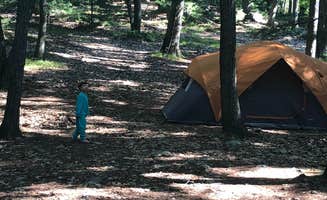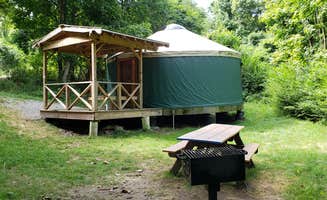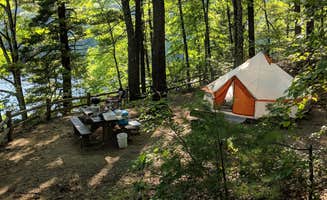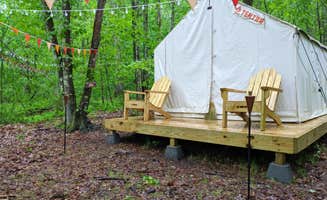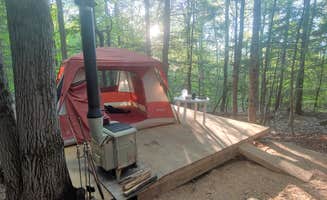Tent camping near South Lancaster, Massachusetts ranges from lakeside spots to forested campsites, all within an hour's drive. The area sits at the edge of central Massachusetts where elevations range from 300-1000 feet, creating varied microclimates across different campgrounds. Most local tent-only sites require some gear transportation from parking areas to campsites, with distances varying from 50 yards to nearly a mile.
What to do
Hiking near waterfalls: At Tully Lake Recreation Area, campers can take an easy hike along Doane's Falls. "If you'd like to hike with children, there is an easy hike close to the entrance, along Doane's Falls, a series of 5 waterfalls along an ascending path through a wooded area," notes Nancy R. Professional photographers often capture these views.
Paddling exploration: Rent canoes or kayaks to explore the waterways. "We take our canoe and spend the whole day at the lake. You can find lots of private areas to swim, pick blueberries and relax," shares Ben P. about Tully Lake. Most rental facilities charge $15-25 per hour with discounts for full-day rentals.
Island camping adventures: Take a ferry to Boston Harbor Islands State Park for a unique experience. "Just getting to the island is a fun adventure. The island is beautiful and has an old fort to explore as well as a lot of Rocky shoreline and trails," writes Martha H. Ferries run from May through October with multiple departure times daily.
Disc golf: Play the course near Tully Lake dam. "A disc golf course is also near the dam and was seeing a fair amount of activity," notes Jean C. The 18-hole course offers challenges for beginners and experienced players with rental equipment available at the ranger station.
What campers like
No-vehicle campsites: Many campers appreciate the car-free environment at tent-only campgrounds. "No cars at all at the campsites, which was great for peace of mind as our toddler roamed around. It also made for a super quiet stay," reports Megan G. about Tully Lake. The absence of vehicles creates a more natural, peaceful setting.
Island seclusion: Overnight stays on the harbor islands provide rare solitude near the city. "Sitting on the beach watching the sun set over Boston was awesome and made everything entirely worth it," shares Jess G. about Lovells Island. Island camping requires advance planning as ferries stop running in early evening.
Wildlife observation: Many tent sites offer chances to spot local wildlife. "In mid-August we collected handfuls of blackberries as we explored Peddocks," mentions Jean C. Morning and evening provide the best wildlife viewing opportunities, with deer, foxes, and numerous bird species common throughout the region.
Historical exploration: Several campgrounds feature remnants of the area's past. At Federated Women's Club State Forest, "You'll find cellar holes throughout, remnants of the towns lost in the 30s to create the reservoir," explains Jean C. These historical sites provide context for the region's development.
What you should know
Water access varies: Not all campgrounds provide drinking water. "Bring your own water. There is a composting toilet located near the group site in the field," advises Jean C. about Federated Women's Club State Forest. Plan to bring 1-2 gallons per person per day, especially at primitive sites.
Cell coverage limitations: Many camping areas have poor reception. "Cell phone coverage is faint to nonexistent on Verizon. You may want to download offline maps before you head out," notes one camper. This affects most carriers throughout the region's more remote campgrounds.
Reservation requirements: Popular tent sites fill quickly during peak season. For Boston Harbor Islands, Martha H. advises, "These sites book quickly, so you should try to book 7 months to the day in advance. That said, you can also look for last minute openings."
Transportation logistics: Some sites require special planning. For island camping, "Getting to the island was a bit of a hassle. We live in Boston and took all of our gear on the T to the harbor by the aquarium," shares Jess G. Similarly, at Barton Cove Campground, "You check in at the office, grab a key to unlock the gate, drive to the campground, unlock gate, drive through gate, lock gate, unload your stuff," explains Brie B.
Tips for camping with families
Choose walk-in sites for safety: Car-free campgrounds provide peace of mind. "No cars at all at the campsites, which was great for peace of mind as our toddler roamed around," shares Megan G. about her Tully Lake experience. This setup allows children to explore more freely within sight of camp.
Look for shallow swimming areas: Some locations offer kid-friendly water access. At Camp Nihan Education Center, "The camp is also adjacent to Breakheart Reservation, which had a great shallow pond with life guard on duty as well as bike trails," notes Michael V.
Consider noise levels: Some campgrounds become noisy on holidays. Lauren A. mentions about Tully Lake, "We went memorial day weekend few years ago, busy holiday of young teens partying. Park staff tried their best, but other campers definitely took away from our stay."
Check bathroom proximity: Campsite location relative to facilities matters with children. "Our site was fairly far from services, long run with small kids in the middle of the night," explains Lauren A. about their Tully Lake experience. Request sites closer to bathrooms when booking with young children.
Tips from RVers
Limited RV options: Most tent camping areas near South Lancaster restrict or don't accommodate RVs. No-vehicle policies at walk-in sites like Tully Lake make them unsuitable for RV camping. "The campsites are spacious and though there is not a bad site, some are better suited for certain purposes like group camping," notes Miguel B.
Alternative developed campgrounds: For RV camping, look beyond the immediate tent-focused options. At Lost Boys Hideout, "Nice new tents provided at Sleepy Hollow site. Improvements to the firepit, area all mulched, even some games and water are provided," shares Steve K., highlighting amenities that complement traditional RV comforts.
Consider glamping options: For RV amenities without the vehicle, explore glamping. "Simplicity at its best," notes Steve K. about Lost Boys Hideout, which offers furnished tent sites with many conveniences RVers appreciate.


